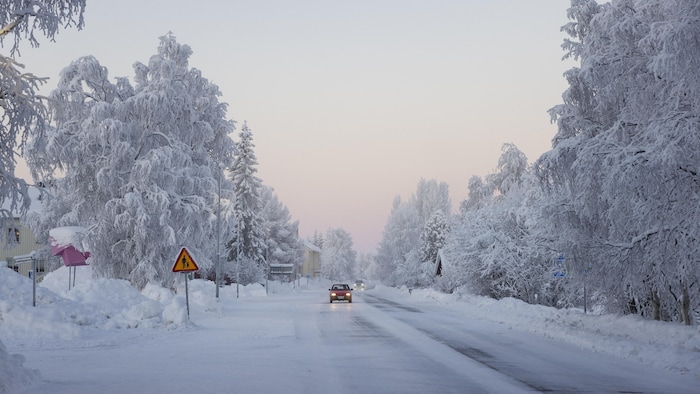Open in full screen mode The village of Vittangi in northern Sweden has experienced these In recent weeks, temperatures have been well below normal, reaching -38.9 degrees Celsius on January 3. Agence France-Presse Climate change due to human activities should result in extreme cold waves in Northern Europe that are rarer but, paradoxically, potentially more dangerous, according to a study published Wednesday. Finland, Sweden and Norway experienced a severe cold spell in January which broke records: -44.6°C recorded in the locality of Vittangi, in the north of Sweden, the lowest recorded in these three countries since the turn of the century, and the mercury for the first time below -30°C (-31.1°C) in Oslo. Linked to arctic air flows, these episodes severely disrupted transport, damaged water pipes, led to the closure of schools and caused electricity prices to jump, source of heating widespread in the region. Without anthropogenic warming, recorded temperatures would have been around 4°C colder, according to the new study by World Weather Attribution (WWA) scientists . On a planet 1.2°C warmer than in the pre-industrial era, such episodes are becoming rare in Northern Europe: today, a five-day cold spell and one cold day extreme are respectively five times and twelve times less likely, according to this team of 19 international researchers. Cold waves are becoming less intense and less frequent, but this is not a reason to rejoice, warns Izidine Pinto, from the Netherlands Meteorological Institute. Loading ELSE ON INFO: Students take accelerated construction training to “renovate their chalet” Among the risks noted by these scientists, the one that the Nordic countries, today accustomed to extreme cold, do not let down their guard. Cold waves remain a significant risk for the region, says Dorothy Heinrich, climate risk advisor at the Red Cross and Red Crescent Climate Center. Even if they occur less frequently on average, future ones could potentially have a greater impact if risk perception and [level of] preparedness are decreasing, she said. Like other extreme weather episodes, they could in particular have fatal consequences for the most fragile populations that it is crucial to protect. The elderly, children, those living in precarious housing, and those facing fuel poverty or homelessness are particularly vulnerable to these cold temperatures, notes Dorothy Heinrich. Fluctuations below and above 0°C also cause problems. The constant freezing and thawing of water poses challenges for infrastructure and road safety, notes Erik Kjellström, climatologist at the Swedish Meteorological and Hydrological Institute. It can also create a more layered snowpack that increases the risk of avalanches and reduces access to food for reindeer and other animals, he adds. < p class="StyledBodyHtmlParagraph-sc-48221190-4 hnvfyV">In the north of these Nordic countries, the global rise in temperatures is leading to a reduction in sea ice which, in turn, contributes to accelerating warming in the region. According to a study published in 2022 by Finnish and Norwegian researchers, the Arctic has warmed nearly four times faster than the rest of the world since 1979, a phenomenon known as Arctic amplification. . Until we abandon fossil fuels and reduce emissions to net zero, climate change will continue to harm the Earth a place that is more difficult to inhabit, argues Sjoukje Philip of the Netherlands Meteorological Institute. At COP28 in Dubai in December, the international community agreed to gradually move away from fossil fuels. But hydrocarbon-producing countries, including Norway, continue to award oil and gas exploration permits that still promise good times for the industry. A text by Pierre-Henry Deshayes
Students take accelerated construction training to “renovate their chalet”
Northern Europe: rarer, but potentially dangerous extreme cold spells

